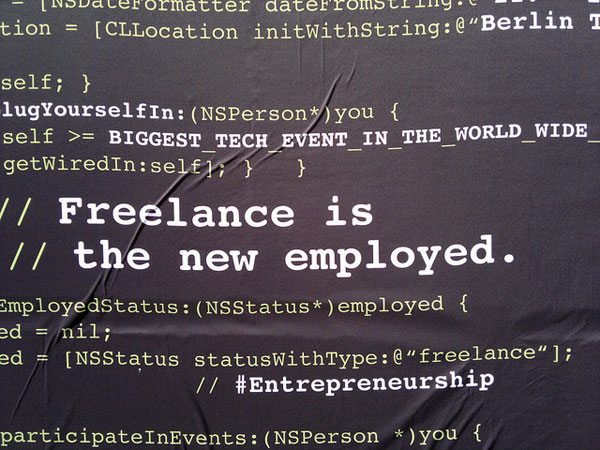
May 21, 2018; Next City
Of the 400,000 freelancers working in New York city, 36 percent reported being paid late in the last year, and 27 percent reported being paid less than they were owed. To combat the exploitation of freelancers, New York passed the Freelance Isn’t Free Act in 2017. It requires contracts for services worth at least $800 and payment within 30 days of service unless otherwise specified in the contract. One year later, it appears that law has directly helped hundreds of people who have had their complaints resolved under the law (and surely indirectly helped thousands more), but those who are often systemically excluded from full labor participation are still not realizing the full benefits.
Many readers will see the word “freelance” and think of writers, artists, and other creative professionals. However, day laborers, especially those without immigration papers, often get paid by the job as well, as do other, more technically minded workers. And, as NPQ recently covered, many companies, such as Uber and Lyft, as well as some package delivery services, have made it part of their business model to pay people doing work for them as independent contractors rather than employees, a policy that has been challenged by the California Supreme Court’s recent Dynamex decision. A study conducted jointly by Upwork and the Freelancers Union showed that 57.3 million Americans, or 36 percent of the workforce, worked as independent contractors in 2017. A 2016 survey of freelancers found that 70 percent of freelancers would like to see more discussion of how to empower the independent workforce.
New York’s Office of Labor Policy & Standards (OLPS) empowers both freelancers and works with employers to create fair labor practices. Pursuant to the law, the Department of Consumer Affairs (DCA) works as a consultant and mediator for freelancers who bring inquiries and requests for help getting payments that come late or not at all. DCA said,
The report indicates that 21 percent of workers who filed a complaint with DCA received payment following the initial consultation with a navigator, 77 percent received payment after a navigator sent a notice of complaint to the hiring party, and 2 percent were resolved after the freelancer filed a suit in civil court.
The law strongly incentivizes settling over taking issues to court, so the majority of employers opted to go that route. So far, nearly 300 freelancers have recovered a total of $254,866.
We have also reported on the burden artists bear when asked to contribute to charity auctions for free. Because the only thing they can claim on their taxes is the cost of the materials, they lose money contributing work, creating a situation in which those without another source of income often can’t afford to be artists. This is a burden many creative freelancers share, in which they are asked to pursue their profession without compensation “for the exposure,” often for companies that could afford to pay them. Yasmin Nair, a writer for Vox, has declared she will not work for free for sites like Huffington Post or Gawker because writing isn’t her hobby, it’s her job, and deserves to be treated and paid equally.
Sign up for our free newsletters
Subscribe to NPQ's newsletters to have our top stories delivered directly to your inbox.
By signing up, you agree to our privacy policy and terms of use, and to receive messages from NPQ and our partners.
NPQ has reported before on the exploitation of freelance workers, when Larry Goldbetter, president of the National Writers Union, said, “This is widespread in the industry, and it’s very hard to deal with on your own. The clients and the publishers have more money than the freelancers do. And it’s a common practice for them to stiff people.” Fortunately, this law seems to be changing that for some.
The next step is to make sure the benefits are reaching all freelance workers. A study done by DCA one year in shows that “compared to all NYC freelancers, complainants to OLPS were more likely to be young, English-speaking, highly educated, and had higher income,” and “fewer than two out of every 1,000 workers who could have engaged OLPS for assistance in the past year did so.”
In other words, it seems the people who most need legal support for their claims are not aware of this law that could help them.
Anthony Damelio, Associate Director, New Immigrant Community Empowerment, says, “New Immigrant Community Empowerment (NICE) and our members are grateful for the work of the Department of Consumer Affairs (DCA) and the Office of Labor Policy and Standards (OLPS) in helping immigrant workers know their rights and find relief when employers exploit them. DCA staff members have collaborated with NICE to perform outreach to day laborers and immigrant workers and offer trainings on how to best protect themselves against wage theft through the Freelance Isn’t Free Act. NICE is grateful for the continued collaboration with DCA to provide support that allows immigrant workers to thrive in New York City.”
DCA Commissioner Lorelei Salas says, “DCA will use the findings from this report to better inform our educational outreach to ensure that all New Yorkers’ rights at work—whatever kind of work it is—are protected.”
If the US is truly shifting toward a gig economy, as so many claim, then it’s important that worker protections are built in to the new model. The gig economy can only realize its touted benefits of flexibility and opportunity when standards of conduct are adhered to; otherwise, it risks reinforcing economic inequality.—Erin Rubin













